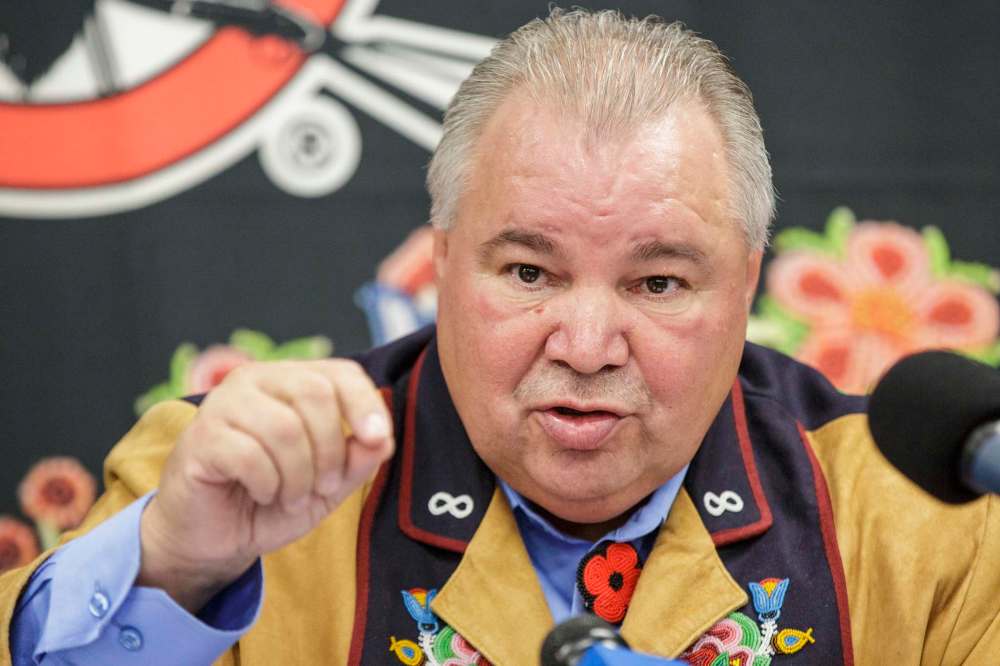Flood-channel project consultation falls short, federal agency says
Advertisement
Read this article for free:
or
Already have an account? Log in here »
To continue reading, please subscribe:
Monthly Digital Subscription
$0 for the first 4 weeks*
- Enjoy unlimited reading on winnipegfreepress.com
- Read the E-Edition, our digital replica newspaper
- Access News Break, our award-winning app
- Play interactive puzzles
*No charge for 4 weeks then price increases to the regular rate of $19.00 plus GST every four weeks. Offer available to new and qualified returning subscribers only. Cancel any time.
Monthly Digital Subscription
$4.75/week*
- Enjoy unlimited reading on winnipegfreepress.com
- Read the E-Edition, our digital replica newspaper
- Access News Break, our award-winning app
- Play interactive puzzles
*Billed as $19 plus GST every four weeks. Cancel any time.
To continue reading, please subscribe:
Add Free Press access to your Brandon Sun subscription for only an additional
$1 for the first 4 weeks*
*Your next subscription payment will increase by $1.00 and you will be charged $16.99 plus GST for four weeks. After four weeks, your payment will increase to $23.99 plus GST every four weeks.
Read unlimited articles for free today:
or
Already have an account? Log in here »
Hey there, time traveller!
This article was published 11/07/2019 (2347 days ago), so information in it may no longer be current.
OTTAWA — Manitoba Premier Brian Pallister’s legacy flood-channel project appears to be hitting delays, as Ottawa claims the province needs more Indigenous input.
In a letter obtained by the Free Press, the Canadian Environmental Assessment Agency accused Manitoba Infrastructure of botching its ongoing consultations for the Lake Manitoba and Lake St. Martin outlet channels project.
In a Thursday interview, Pallister called it an unfair characterization of an unfinished process.

“We’ve been working our tail off to hear the concerns of all,” the premier told the Free Press.
The CEAA letter says “multiple” reserves and the Manitoba Metis Federation feel the province either hadn’t adequately consulted them, or didn’t reach out at all.
“Multiple participants articulated anticipated deficiencies in the environmental impact statement, related to the reflection of their nations’ perspectives, concerns, knowledge and expertise — especially given the proposed August 2019 submission date,” reads the CEAA’s June 27 letter, which was sent to stakeholders such as MMF president David Chartrand.
“If you’re not taking any of the responsibilities you have — legally, constitutionally — you won’t get a licence,” said Chartrand. “I’m going to hold (Pallister) accountable for this, and make sure he doesn’t get away with this.”
Chartrand said Métis communities in the Interlake region are concerned about zebra mussels and algae flowing across the two lakes through the channels, and claims the MMF has grappled to learn whether officials have researched those issues.
He said the MMF is “not at all” opposed to the diversion project, but fears “serious ramifications” for Métis communities whose livelihoods depend on fishing.
Pallister said the Manitoba government has held more than 100 meetings, 10 open houses, and a website detailing the project and its potential adverse effects.
The letter comes as a result of an advisory panel the CEAA formed to examine the project’s impact on Indigenous communities.
The CEAA did not respond by deadline about when it created the panel, but Pallister raised concerns in November about the number of groups it invited to weigh in, including First Nations located 500 kilometres downstream along the Nelson River.
The CEAA letter indicates its advisory panel only started meeting June 5.
Pallister said his government has reached out to those far-flung communities after Ottawa “moved the yardsticks,” despite it adding to provincial costs, and possibly pushing the project application past its August deadline, which could delay construction by months.
“If there’s any frustrating it’s because I know so many of these people, Indigenous (and not),” the premier said.
“They’ve been living with this uncertainty of flooding for years; their families are hurting,” he said. “If we keep going at this pace, we may have their lives protected when they’re dead and gone — and maybe it’s their great-grandkids, if they’re still hanging around.”
Previously, Pallister has suggested the federal government wants to delay the flood-channels project.
The Liberals have responded by citing their historic investment of almost half the project’s $540-million cost in June 2018. The PC government had successfully pushed for months to keep the project outside of the province’s general infrastructure allotment.
While multiple federal and provincial leaders were at that funding announcement last summer, First Nations chiefs complained they hadn’t even been invited.
The June 27 letter is a summary of issues Indigenous groups raised earlier in the month. The CEAA will publish a full report in more detail.
The province has already had routes cleared for the project, prompting the Interlake Reserves Tribal Council to warn in April this could “further erode an already difficult relationship” between First Nations and the province.
The premier had urged Ottawa to fast-track the project, which was proposed in 2013 to mitigate flood risks and prevent a repeat of the 2011 Assiniboine River flood.
dylan.robertson@freepress.mb.ca
Federal letter on Indigenous consultations for Interlake flood-channel outlet project
History
Updated on Thursday, July 11, 2019 7:55 PM CDT: Writethrough
Updated on Thursday, July 11, 2019 10:23 PM CDT: Updates headline


